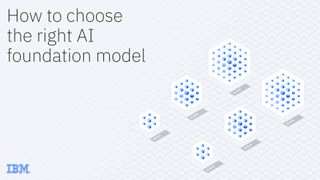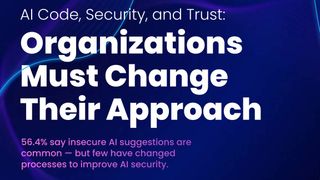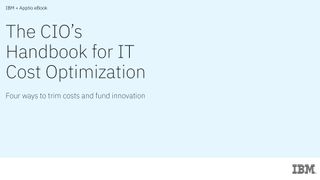Pegasystems wants to provide AI for ideation – PegaWorld iNspire 2024 can be its launch pad
Pegasystems' track record with automation puts it in a solid position for AI adoption – but it believes the real value of the technology is in fundamentally changing the development process

Pegasystems is no stranger to AI. The software company’s founder, Alan Treffler, was working on training computer systems to play chess at Dartmouth College when he first established the firm in 1983 and Pega began handling predictive AI systems in 2012.
In the twelve years since, the customer relationship management (CRM) and business process management (BPM) specialist has used machine learning (ML) algorithms to process and digest data to provide insights for employees. What started with enterprise case management has expanded to include customer services.
At PegaWorld iNspire 2024, taking place in Las Vegas from 9-11 June, the company is pinning its hopes on showing firms it can drive further value for enterprises by deploying generative AI earlier into the development timeline, providing assistance at the ideation stage.
In charting this new course, Pega has an opportunity to build on its flagship low-code and automation products while showing how it can set itself apart on the crowded AI stage.
Pegasystems unveiled its generative AI assistant Buddy in January 2024, getting in on the rush to roll out AI copilots across every conceivable business vertical. Like many of its competitors, Buddy can output text, summarize transcripts, and answer natural language customer questions.
The system collates content from across an often siloed enterprise knowledge base to answer queries from employees and customers alike.
Since the announcement, Pegasystems has worked to differentiate Buddy from the likes of Salesforce’s Einstein AI and the myriad other AI assistants on the market by focusing on its customizability. The company promises that businesses will be able to customize their Buddy assistant according to the department it will be deployed in, suggesting businesses could have a ‘Marketing Buddy’, ‘Sales Buddy’, and ‘Customer Service Buddy’.
Get the ITPro. daily newsletter
Receive our latest news, industry updates, featured resources and more. Sign up today to receive our FREE report on AI cyber crime & security - newly updated for 2024.
Pegasystems' expertise in predictive AI and automation should lend itself nicely to harnessing some of the value its generative counterpart can offer. If deployed correctly, it can complement its existing use of predictive models to build an understanding of what an employee or customer is looking for across its customer service, sales, marketing, or automation platforms with the creative potential of LLMs, and seamlessly help generate useful content and more.
But the company wants to draw a clear line between what it calls ‘generative AI features’ on the one hand and the use of generative AI to fundamentally transform the fabric of business processes themselves.
For example, many of the capabilities Buddy can offer such as generating emails according to your company style or summarizing a conversation for call center reps would be classified as features enabled by the creative capacity of LLMs.
The next frontier, where generative AI has a more radical impact, is when it structurally changes how businesses operate, and this is where the real opportunity lies for the business.
Changing the workflow of AI-assisted development
A core product in Pegasystems' AI lineup, touted as something of a game changer by the company’s leadership, is its GenAI Blueprint solution, introduced in March 2024.
Blueprint allows users to synthesize workflows automatically using guided questions. The platform applies both predictive and generative AI to understand what the user is looking for and uses this context to design workflows for a wide range of applications that might fit their needs.
Take, for example, a business looking to improve their customer experience. Blueprint uses predictive AI models to establish what a good customer experience constitutes based on previous customer behavior, and the system’s LLMs will suggest a selection of potential designs for the application.
The user can then customize the design as they see fit, before getting started on development. This presents a strong value proposition from Pegasystems, separating it from other AI-powered low-code app development platforms which often bundle the design and development stages together.

Discover the most appropriate AI model for your organization
Moving in this direction, the firm could help get around concerns over the quality of the apps developed using AI and other low-code platforms, with businesses hesitant about spinning up and maintaining apps with AI-generated code.
Blueprint will also enable collaboration across departments during the workflow design process. It picks up where its Directly Capture Objectives platform left off, Pegasystems says Blueprint will facilitate a deeper collaboration between business leaders and IT departments to drive stakeholder engagement and stimulate innovation.
Pegasystems looks to separate itself from other AI-code generation platforms, focusing less on spitting out lots of code and more on actually enhancing the application design workflow itself.
PegaWorld offers the firm a good opportunity to expand on this lead and show how it is pushing deeper integrations of generative AI into the fabric of the business itself with products like Blueprint.
Bringing generative AI into the ideation stage of development sounds like it could bring a lot of value to businesses, but Pegasystems needs to show what this means in practice before businesses take the leap.
As the AI-code generation market becomes increasingly saturated and customers look for solutions that can also help with the ideation stage of application development, Pegasystems has a clear role to fill.
In addition to a host of new generative AI features to the company’s flagship products in automation and low-code development, we can expect to hear more at PegaWorld iNspire 2024 from the firm’s customers detailing how this new approach to development can improve their AI adoption and digital transformation.
At PegaWorld iNspire 2024, the firm finds itself in a good position to build on strong performance over recent years and push on in the new era of generative AI.
If Pegasystems can cut through the marketing fluff and show how it is leading the pack on integrating generative AI deeper into business processes in innovative and lucrative ways, it can take a unique chunk of the AI market all for itself.

Solomon Klappholz is a Staff Writer at ITPro. He has experience writing about the technologies that facilitate industrial manufacturing which led to him developing a particular interest in IT regulation, industrial infrastructure applications, and machine learning.



